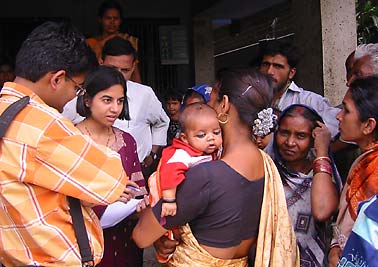Potholes the size of UC Berkeley, wind like a hair dryer, and good vs. bad clinics
After our initial introduction to the Janani organization on Monday, we spent the next three days in the field researching the clinics, shops, clients and competitors of the network. It was a challenging and eye-opening experience to say the least.
First of all, the traffic. Considering the driving behavior in India, it's a miracle that the Indian population is one of the fastest growing in the world. Trucks, buses, cars, auto rickshaws, bicycle rickshaws and pedestrians are constantly struggling to occupy a scarce piece of asphalt. Passing another vehicle cannot happen without excessive honking and flashing of headlights, inevitably resulting in tons of near-misses and some near-death experiences for the team. The road surface varies, from decent strips of asphalt to rocky and bumpy paths with potholes the size of the UC Berkeley campus. Add in a temperature of around 106 degrees and a wind stronger and hotter than the average blow dryer, and we have a challenge on our hands.
 Mona and Amit interview a rural medical practitioner. |
Government health services are scarce in Bihar. After visiting one of the government clinics we decided that maybe that is for the better: an absolute lack of hygiene and available services make these the most atrocious places to receive health care. We saw the operating theater, a dark room where the available equipment consisted of a wobbly table and used syringes lying all over the place. The services at these clinics are usually free and are aimed at the poorest of the poorest.
Janani's 500 Surya clinics — the focal point of our research — aim at the clients who are willing and able to pay a small amount for reproductive health care services. As franchisees in the Janani network, these clinics benefit from cheap products, a strong brand value, and joint advertising (Janani is the largest radio advertiser in the state of Bihar).
The quality of the clinics differs. Some have clean operating theaters and are sufficiently lit and ventilated. Others, however, have dark operating rooms with poor hygiene and lack basic facilities such as a generator and disinfecting devices.
Janani is currently in the process of elevating the level of quality in the Surya clinics through the opening of new clinics and by not renewing the franchises for the low-quality clinics. The organization also aims to have better regional distribution of the clinics, ensuring that everyone lives within 10 kilometers (6 mi.) of a clinic. By the end of this year one should be able to see a dramatic increase in the quality and accessibility of Surya clinics.
This is where we come in. These weeks in Bihar we will focus on improving the network of Surya clinics by looking into additional services (such as laboratory facilities), assessing the feasibility of introducing health care insurance, and revising the ownership structure to promote ownership and accountability at all levels. Janani has made a huge impact in this area of India by starting this network of clinics and outlets for reproductive health care. We consider it to be an honor to be part of this organization for three weeks and to have the opportunity to contribute to their success.
— Amit and David



